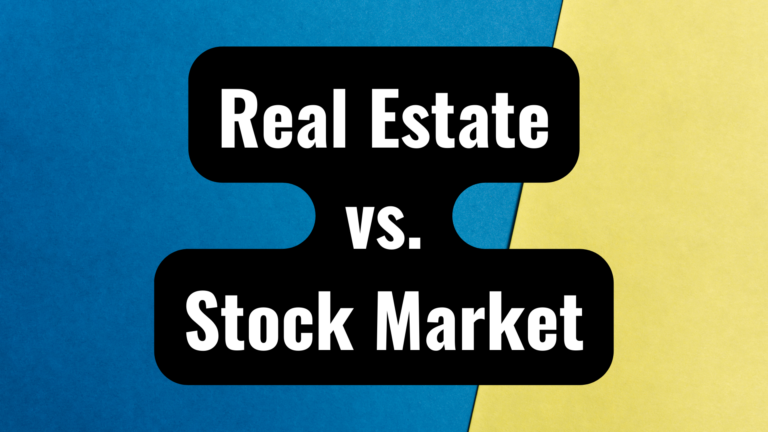The stock market is an ever-popular place for investors to put their money, with real estate being one of the most popular forms of alternative investment. But which is better? Real estate vs. the stock market?
Today we’re going to dive into the differences between these two types of investments so that you can decide which one is right for you.
Let’s do it!
Real Estate vs. Stock Market: Real Estate

Real estate is essentially land and all the “things” that are on that land, including buildings and natural resources.
People invest in real estate for a variety of reasons, including to live in a house, to make money off of the appreciation of the house, or two rent the house to tenants.
Real Estate: Price
The price of real estate will vary, but we can almost certainly say that it won’t be cheap. Especially when you take into account the added burden of closing costs, inspections, and other costs outside of the price of the actual real estate, you can expect to be spending anywhere from tens of thousands to millions of dollars to buy real estate.
Of course, you won’t have to spend all this money up front if you use a loan to help you buy your real estate, which is what most buyers do.
If you take out a loan, you’ll only have to pay a certain percentage of the price of the real estate down payment.
This down payment might be 20%, or it might be less than 5%, depending on what type of loan you get and the purpose you’re planning on using the real estate for.
After paying your down payment, you’ll make monthly payments to pay off the loan.
But don’t forget that buying real estate will inevitably come with a bunch of added fees, such as paying for appraisals and credit checks.
And after you’ve bought the real estate itself, you’ll have a combination of other regularly occurring costs such as private mortgage insurance (PMI), HOA fees, and homeowner’s insurance.
Don’t let these extra costs sneak up on you!
Real Estate: Liquidity

Let’s say you own a house that’s worth $300,000.
Can you use that $300,000 to make a purchase today?
Unfortunately, the answer is no.
This is because real estate is an illiquid asset, meaning that it is not easily convertible into cash.
In order to get cash in your hands for a house, you’ll have to go through the selling process…
…Spoiler alert: it’s a lengthy process.
You’ll need to hire a real estate agent, list the house, wait for an offer, and then wait for the buyer’s funding to come through.
Unfortunately, the buyer isn’t always able to get the loan they want, so contracts fall through sometimes.
So you might be waiting weeks or months before you get a check for your house!
Real Estate: Returns
The return you earn for your real estate depends on what exactly you’re doing.
If you buy a house and then sell it a couple years later, you could make a huge return.
Your house can appreciate in value for a number of reasons, including a rise in the value of the neighborhood, changes you’ve made to the house, and the state of the real estate market in general.
If you buy a house and rent it out to tenants, your return will be a lot slower. It will take you years to recover your investment, but it’s also a relatively reliable stream of passive income, which is a huge plus.
Real Estate: Risk
Real estate prices don’t tend to be as volatile as stock prices, but that doesn’t mean that there’s no risk involved in the real estate market.
For example, let’s say you buy a house in the hopes that it will appreciate in value and you can sell it for a big gain.
What if the neighborhood becomes dangerous and the prices of all homes in the area drop? What if the real estate market declines right when you’re about to sell?
These are very real situations that are important to consider; it’s a lot more difficult to diversify away your risk when you own a house than it is when you own a portfolio of stocks.
Of course, some of this risk can be hedged by buying various forms of insurance, but that will cut into your bottom line.
Real Estate vs. Stock Market: Stock Market

Stocks are a more common form of investment that have different pros and cons than real estate.
Stock Market: Price
The price of investing in stocks can vary greatly depending on what you’re looking for.
As far as the stock price, a stock can cost less than $5 (penny stocks), or hundreds of thousands of dollars (Berkshire Hathaway).
You can also buy fractional shares with many brokers, which means you should be able to create your ideal portfolio with any amount of money.
As far as transaction costs, these will vary depending on your brokerage and the type of security you’re buying.
First off, make sure you’re signed up for a commission-free brokerage like Robinhood or M1 Finance.
Then, think about what exactly you want to buy.
If you’re buying a stock, you should expect to pay nothing in transaction costs.
If you’re buying an ETF, you shouldn’t have any special costs up front, but there will be management fees that reduce the price of the ETF.
And if you want to buy into a mutual fund, you should be prepared to pay all sorts of fees, from a front-load, to management fees, to fees you pay if you sell your shares.
Stock Market: Liquidity
The stocks in your portfolio are (usually) going to be a whole lot more liquid than a piece of real estate.
While a house would take you quite a bit of time to go through the process of selling, you can generally sell a stock almost instantly.
Once you sell your stock(s), all you have to do is withdraw the money from your brokerage account.
This transfer usually takes a few days, but after it’s done, you have your money right there in your bank account!
There are a few things worth noting when it comes to the liquidity of stocks.
Firstly, if the stock you want to sell tends to have a low trading volume, you might actually be unable to sell it.
This is almost never an issue when you’re trading popular stocks like blue-chip stocks or FAANG stocks, but think about a penny stock or a share of a lesser-known company.
You’re not guaranteed to have a buyer for your stock, so think logically about what you have in your portfolio before you label it as highly liquid.
Stock Market: Returns

If you invest in the stock market over a long period of time (we’re talking decades) and take the proper asset allocation precautions, you can be reasonably confident that you’ll bag a good return.
The S&P 500 has posted an average annual return of around 10% since the 1950s, or somewhere around 7-8% after adjusting for inflation.
You can expect higher or lower returns based on how much risk you decide to take on as well.
Stock Market: Risk
There will always be risk when you invest in the stock market.
In general, you can expect a relatively stable return in the long term when you invest in the market as a whole or in blue-chip stocks.
You can decide to take on more or less risk depending on how you construct your portfolio.
Of course, this risk can be mitigated in various ways, one of the easiest ways being diversification.
Final Thoughts
Neither real estate nor the stock market should be considered inherently “good” or “bad” investments.
There are different factors to be weighed and different reasons why someone might want to invest in either.
Just don’t forget that you should never invest money that you aren’t willing to lose!
We are paid subscribers to dozens of stock newsletters. We actively track every recommendation from all of these services, calculate performance, and share the results of the top performing stock newsletters whose subscriptions fees are under $500. The main metric to look for is "Excess Return" which is their return above that of the S&P500. So, based on last 3 years ending June 29, 2025:The Best Stock Newsletters as of June 29, 2025
Ranking of Top Stock Newsletters Based on Last 3 Years of Stock Picks
Rank Stock Newsletter Stock
PicksAverage
ReturnExcess
ReturnPercent
ProfitableMax %
Return1. ![]()
Alpha Picks76 63% 40% 73% 969% Summary: 2 picks/month based on Seeking Alpha's Quant Rating; Retail Price is $499/yr. See details in our Alpha Picks Review. July, 2025 Promotion:
Save $502. ![]()
Moby.co308 43.3% 12.3% 74% 1764% Summary: 60-150 stock picks per year, segmented by industry; Retail Price is $199/yr. Read our Moby Review. July, 2025 Promotion:Next pick free! 3. ![]()
Stock Advisor72 41.2% 6.9% 78% 258% Summary: 2 picks/month and 2 Best Buy Stocks lists focusing on high growth potential stocks over 5 years; Retail Price is $199/yr.
Read our Motley Fool Review.July, 2025 Promotion: Get $100 Off 4. ![]()
Value Investor39 17.5% 6.1% 38% 410% Summary: 10-25 stock picks per year based on Zacks' Quant Rating; Retail Price is $495/yr. Read our Zacks Review. July, 2025 PROMOTION:$1, then $495/yr 5. ![]()
Rule Breakers66 40.0% 4.7% 61% 311% Summary: 2 picks/month focusing on disruptive technology and business models; Lifetime average return of 355% vs S&P500's 149% since 2005; Now part of Motley Fool Epic. Read our Motley Fool Epic Review. Current Promotion: Save $200 6. 
TipRanks SmartInvestor121 10.6% 3.7% 55% 340% Summary: About 1 pick/week focusing on short term trades; Lifetime average return of 355% vs S&P500's 149% since 2015. Retail Price is $379/yr. Read our TipRanks Review. Current Promotion: Save $180 7. 
Action Alerts Plus394 20.0% 3.4% 57% 220% Summary: 100-150 trades per year, lots of buying and selling and short term trades. Read our Jim Cramer Review. Current Promotion: None 8. ![]()
Stock Advisor Canada36 32.3% 0.5% 69% 378% Summary: 1 pick/month from the Toronto stock exchange; Retail Price is CD$199/yr. Read our Motley Fool Canada Stock Advisor Review. July, 2025 Promotion: Save $100 Top Ranking Stock Newsletters based on their last 3 years of stock picks' performance through May 31, 2025 as compared to S&P500. S&P500's return is based on average return of S&P500 from date each stock pick is released. NOTE: To get these results you must buy equal dollar amounts of each pick on the date the stock pick is released. Investor Business Daily Top 50 based on performance of FFTY ETF.
